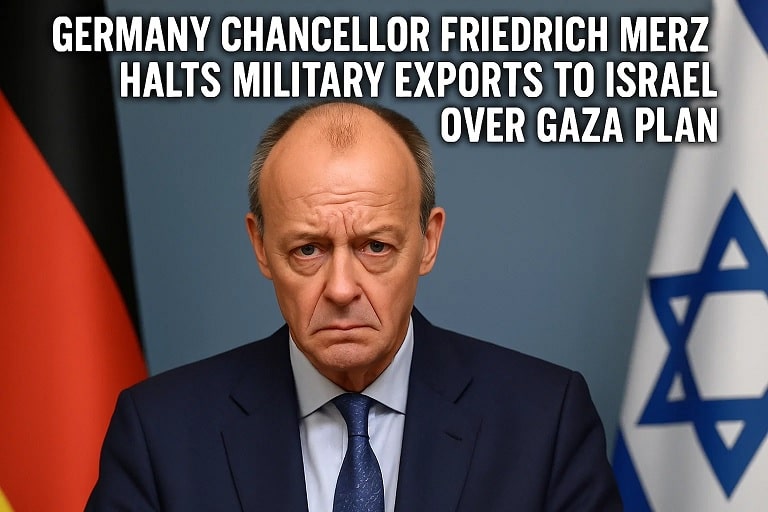n August 8, 2025, German Chancellor Friedrich Merz announced that Germany will suspend all exports of military equipment to Israel that could be used in the Gaza Strip, in response to Israel’s security cabinet approving a plan to take control of Gaza City. The decision, described as a significant policy shift for one of Israel’s closest allies, reflects growing concerns over the humanitarian crisis in Gaza and doubts about the effectiveness of Israel’s escalated military strategy. Germany, which granted €485 million ($564 million) in arms export licenses to Israel from October 7, 2023, to May 13, 2025, emphasized its support for Israel’s right to disarm Hamas and secure hostages but criticized the planned offensive as counterproductive. The move, driven by domestic and international pressure, may strain Berlin-Jerusalem ties and influence other allies’ policies.
Background of the Decision
Germany has been a steadfast supporter of Israel, rooted in historical responsibility for the Holocaust, and supplied 47% of Israel’s conventional arms imports in 2023, second only to the U.S., per the Stockholm International Peace Research Institute (SIPRI). Between October 7, 2023, and May 13, 2025, Germany approved €485 million in military export licenses, a tenfold increase post the Hamas-led attack on October 7, 2023, which killed 1,200 people and saw 251 taken hostage. However, Israel’s war in Gaza, which has killed tens of thousands and caused a starvation crisis, has drawn mounting criticism. Gaza health authorities report 197 malnutrition deaths, including 96 children, with a UN-backed assessment warning of famine.
Israel’s security cabinet approved a plan on August 7, 2025, to seize Gaza City, escalating its 22-month war despite international condemnation from the UK, China, Spain, Turkey, and the UN. Prime Minister Benjamin Netanyahu’s earlier statement about taking full military control of Gaza, followed by a focus on Gaza City, prompted Germany’s response. Domestic pressure in Germany, including an open letter from 200 cultural figures demanding a halt to arms exports and a ceasefire, alongside Nicaragua’s March 2024 case against Germany at the International Court of Justice for alleged complicity in Gaza’s crisis, influenced the decision.
Details of the Export Halt
Chancellor Merz announced the suspension of military equipment exports that could be used in Gaza “until further notice,” citing Israel’s plan as making it “increasingly difficult” to achieve goals like disarming Hamas and freeing hostages. The halt does not apply to exports unrelated to Gaza operations, such as missile defense or naval equipment, allowing Germany to maintain some military cooperation with Israel. Merz emphasized Germany’s priorities of hostage release and ceasefire negotiations, expressing “deep concern” over civilian suffering in Gaza and urging Israel to allow full access for UN and NGO aid deliveries. He also warned Israel against annexing the West Bank, following its parliament’s symbolic July 2025 resolution supporting annexation.
Key Details | Information |
|---|---|
Announcement Date | August 8, 2025 |
Reason | Israel’s plan to take control of Gaza City |
Scope | Suspension of military exports usable in Gaza |
Exclusions | Missile defense, naval equipment unaffected |
Previous Exports | €485M ($564M) licenses, Oct 2023–May 2025 |
Merz’s Stance | Supports Israel’s right to self-defense, urges ceasefire and aid access |
Strategic and Political Context
Germany’s decision marks a departure from its historical “Staatsräson” policy, viewing Israel’s defense as core to its national identity due to Holocaust guilt. The move follows weeks of Merz criticizing Israel’s “unclear” Gaza goals and humanitarian impact, amplified by public protests in Berlin and legal challenges from human rights groups. Germany supplied a third of Israel’s arms imports from 2020-2024, per SIPRI, making the halt significant. The decision aligns with international outcry, including UN High Commissioner Volker Türk’s call to halt Israel’s plan and statements from the UK’s Keir Starmer and Spain’s José Manuel Albares condemning the offensive for worsening civilian suffering. Slovenia’s July 2025 arms embargo on Israel set a precedent, with Germany’s partial halt potentially inspiring further European action.
Posts on X reflect mixed sentiments, with some praising Germany’s stance as a response to Gaza’s crisis, while others argue it undermines Israel’s security. The EU remains divided, with Germany, Hungary, and Austria historically prioritizing Israel’s defense, unlike France and the UK, which plan to recognize a Palestinian state in September 2025.
Implications and Risks
Bilateral Relations: The halt may strain Germany-Israel ties, especially as Israel faces growing isolation. Netanyahu’s claim of distributing aid outside combat zones may not mitigate concerns, given restrictions that have killed hundreds seeking food.
Humanitarian Crisis: Germany’s call for aid access aligns with UN reports of famine and 197 malnutrition deaths, pressuring Israel to ease restrictions.
European Policy: The decision could prompt other EU nations to reassess arms exports, though divisions persist. Germany’s partial halt contrasts with Slovenia’s full embargo.
Domestic Pressure: Public protests and the open letter from 200 cultural figures indicate strong German sentiment against arms exports, which may push Merz to maintain or expand the suspension.
Israel’s Strategy: Critics, including Israeli voices, fear the Gaza City plan endangers hostages and escalates civilian tolls, potentially undermining Israel’s goals.
What’s Next
Germany will monitor Israel’s actions in Gaza and the West Bank, with the export halt effective until Israel reconsiders its offensive or humanitarian conditions improve. Merz’s government is likely to push for ceasefire talks and hostage release in upcoming diplomatic engagements, possibly through EU or UN channels. The decision’s impact on Israel’s military operations remains unclear, as the U.S. continues to supply 53% of its arms. Domestic pressure in Germany may grow, with protests and legal challenges potentially expanding to demand a full embargo. The EU’s response, particularly from divided members like Hungary, will shape whether Germany’s move sparks broader policy shifts. Israel’s next steps, including any aid distribution or escalation, will determine if Germany resumes exports or takes further action.
Conclusion
Germany’s suspension of military exports to Israel for use in Gaza, announced on August 8, 2025, reflects a pivotal shift driven by Israel’s Gaza City takeover plan and the enclave’s worsening humanitarian crisis. Chancellor Merz’s decision, balancing support for Israel’s security with concerns over civilian suffering, responds to domestic and international pressure, including UN famine warnings and public protests. While sparing non-Gaza-related exports, the halt challenges Germany’s historical alliance with Israel and may inspire other European nations to act. As Israel faces global condemnation and Germany pushes for a ceasefire, the coming weeks will test whether this policy shift reshapes the conflict or bilateral ties, amid a volatile regional and diplomatic landscape.














